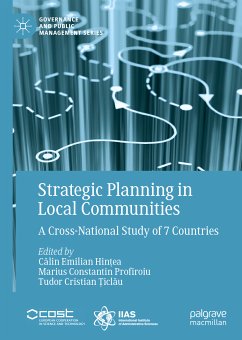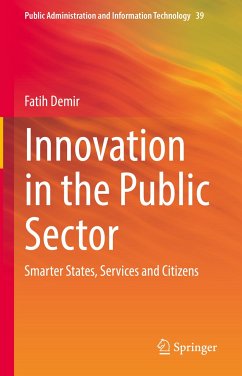
Public Management Reform in Turkey (eBook, PDF)
The Impact of Europeanization and Beyond
Versandkostenfrei!
Sofort per Download lieferbar
40,95 €
inkl. MwSt.
Weitere Ausgaben:

PAYBACK Punkte
20 °P sammeln!
This book discusses the Europeanization of Turkish public administration since the early 2000s, offering an analysis of the transformation and basic features and problems of Turkish public administration in relation to the EU accession process.The book consists of six chapters and a conclusion. The first chapter sets the stage by evaluating the public administration reforms in Turkey from the perspective of Europeanization and the European Administrative Space (EAS). The second chapter discusses the administrative procedures based on the European Union's Charter of Fundamental Rights, and expl...
This book discusses the Europeanization of Turkish public administration since the early 2000s, offering an analysis of the transformation and basic features and problems of Turkish public administration in relation to the EU accession process.
The book consists of six chapters and a conclusion. The first chapter sets the stage by evaluating the public administration reforms in Turkey from the perspective of Europeanization and the European Administrative Space (EAS). The second chapter discusses the administrative procedures based on the European Union's Charter of Fundamental Rights, and explains the EU's relationship with accountable government and democracy. The third and fourth chapters examine the steps taken to improve civic participation in decision-making processes, and assess local governance reforms in Turkey with reference to Europeanization processes and the "policy windows" approach developed by Kingdon. The next chapter addresses regionalization in Europe and its parallels in Turkey, especially in the context of the foundation of regional development agencies. Lastly, the book presents the reactions to the fragmentation of government envisaged by New Public Management (NPM) reforms and describes practices beyond fashioning an integrated administration. It also explores the transformation of the executive organ in terms of its change in status, in relation to other centers of political power. The conclusion provides an overview of the apparent oscillation of Turkish public administration in the 21st century, in terms of Europeanization processes.
This book is useful for academics studying public administration, public management reforms, Turkish politics, and the European Union, as well as government and diplomatic professionals in Turkey and the EU, especially those dealing with enlargement issues.
The book consists of six chapters and a conclusion. The first chapter sets the stage by evaluating the public administration reforms in Turkey from the perspective of Europeanization and the European Administrative Space (EAS). The second chapter discusses the administrative procedures based on the European Union's Charter of Fundamental Rights, and explains the EU's relationship with accountable government and democracy. The third and fourth chapters examine the steps taken to improve civic participation in decision-making processes, and assess local governance reforms in Turkey with reference to Europeanization processes and the "policy windows" approach developed by Kingdon. The next chapter addresses regionalization in Europe and its parallels in Turkey, especially in the context of the foundation of regional development agencies. Lastly, the book presents the reactions to the fragmentation of government envisaged by New Public Management (NPM) reforms and describes practices beyond fashioning an integrated administration. It also explores the transformation of the executive organ in terms of its change in status, in relation to other centers of political power. The conclusion provides an overview of the apparent oscillation of Turkish public administration in the 21st century, in terms of Europeanization processes.
This book is useful for academics studying public administration, public management reforms, Turkish politics, and the European Union, as well as government and diplomatic professionals in Turkey and the EU, especially those dealing with enlargement issues.
Dieser Download kann aus rechtlichen Gründen nur mit Rechnungsadresse in A, B, BG, CY, CZ, D, DK, EW, E, FIN, F, GR, HR, H, IRL, I, LT, L, LR, M, NL, PL, P, R, S, SLO, SK ausgeliefert werden.












